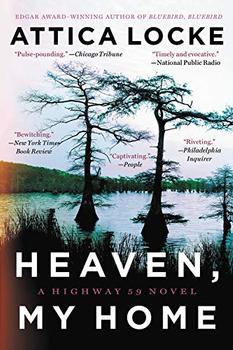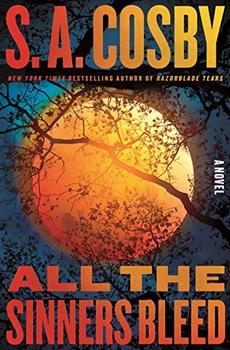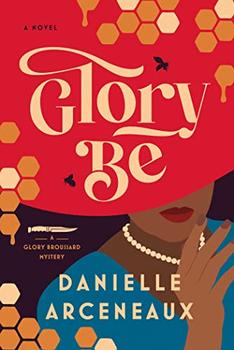Summary | Excerpt | Reviews | Beyond the book | Read-Alikes | Genres & Themes | Author Bio

Critics' Opinion:
Readers' Opinion:
First Published:
Sep 2019, 304 pages
Paperback:
Aug 2020, 304 pages
 Book Reviewed by:
Book Reviewed by:
Elisabeth Cook
Buy This Book
Attica Locke's 2017 novel Bluebird, Bluebird introduced us to Texas Ranger Darren Mathews, who became embroiled in a complex small-town drama while investigating a possible hate crime. Heaven, My Home, the second installment in the series starring the Ranger, weaves an even more intricate location-based plot on the banks of sprawling Caddo Lake.
At the opening of the novel, Darren is struggling with multiple elements of his personal and professional life. He's recently reunited with his wife, Lisa, who initiated a separation after his unauthorized involvement in a situation that may have led his friend Mack, a fellow Black man, to kill Ronnie Malvo, a known white supremacist and member of the ABT (Aryan Brotherhood of Texas). Darren is uncertain as to Mack's guilt or innocence, but has concealed evidence to protect his friend, a fact he's hiding from Lisa. To smooth things over with his wife, Darren has taken on a desk position, resolving to stay out of the field, and cut back on his drinking. At the same time, Darren's mother, Bell, has gotten her hands on the Malvo case evidence and is effectively blackmailing him—expecting favors, monetary and otherwise, for her silence.
These details are introduced against the backdrop of the incoming Trump administration, and the rise of hate crimes in its wake. Darren's supervising lieutenant, Fred Wilson, hoping to score a strike against the ABT, wants Darren to investigate the case of a nine-year-old boy from the tiny community of Hopetown who took a boat out on Caddo Lake one night and never returned home. The boy in question is Levi King, son of incarcerated ABT "captain" Bill King. Wilson hopes that in the course of investigating Levi's disappearance, Darren can obtain information from Bill King, or from Levi's mother, Marnie, that could take down the Brotherhood. As he starts his investigation, Darren allows himself to consider the shameful possibility of extracting a false confession from King—a concerned father who may be desperate enough to negotiate for his son's life—that would allow him to wash his hands of the Malvo case.
This may already sound like a lot, but it's only the foundation of a drama involving land disputes, moral gray areas and deceit in a stretch of country steeped in generational racism and trauma.
Locke has written for television—including the Fox series Empire—in addition to novels, and it's easy to imagine how the sensibilities she's developed from one medium may inform the other. The intricate, shifting plot elements in Heaven, My Home aren't just deftly handled, but deeply intertwined, making for profound world-building that echoes broader American social and cultural realities. At the same time, Locke's writing is approachable; it has literary value, but could appeal to those who aren't normally inclined towards literary work.
Despite the novel's serious subject matter, it's purely entertaining at times; subtle humor and sharp dialogue work to give the text charm. In one scene, Darren goes looking for Leroy Page, an area landowner who was reportedly the last person to see Levi, and encounters Donald Goodfellow and his son Ray, Caddo Natives who are distrustful of Darren and his Ranger status. When they're joined by Donald's mother Margaret, she breaks the tension by asking Darren in for a meal:
"We've got dush'-cut and dah-bus for lunch," she said to Darren. A clear invitation that riled young Ray Goodfellow.
"He's hunting after Leroy, E'-kah," he said.
"He's fishing," she told Darren. "But you welcome to join us while you wait."
Margaret's "He's fishing" cleverly echoes Ray's "He's hunting" while also giving Darren the information he needs, and the word "fishing" has a double meaning that encompasses what Darren is doing as well (fishing for information). This brief, cinematic exchange contributes to the carefully constructed feel of the novel, and also characterizes Margaret as kind and cool-headed, all within a few lines of dialogue. Furthermore, the hint of dialect adds an authentic nuance to the author's depiction of her Caddo characters.
None of this is to say that Locke isn't equally in tune with elements that pertain purely to written fiction. For instance, she uses concise description to make the monstrous, swampy Caddo Lake a vivid presence. When Darren speaks to Marnie about her son, her eyes—described as a "muddy green"—recall the body of water for him. Divining the lake from an unrelated object makes it loom all the more hauntingly in the background.
Similarly, Darren's moral struggles, which turn both inward on his conscience and outward to the powers he's laboring under, are depicted with a sensitivity that illuminates the inseparability of the law from both the people it employs and the criminal organization it seeks to dismantle:
He couldn't believe he was actually entertaining the idea of fabricating evidence, didn't recognize himself at all in this moment...He felt a slow rage building inside of him at the idea that Bill "Big Kill" King could just forget that he'd been a member of a gang whose initiation rite was the obliterating of a black life. He had savagely killed a man and never done any time for it after a Marion County jury had let him walk; it was selling opioids and meth to whites that had crossed a line for the good folks out here.
The author uses effective description and characterization to portray human relationships, nature and history as inevitably linked. This makes the book not just an insightful tale for our current times, but an eloquent and cohesive piece of dramatic writing.
Readers should be aware that while Heaven, My Home can be read by itself, it does read as part of a series. While Darren's investigation in Hopetown wraps up conclusively, some plot points not related directly to the investigation are left unresolved, and the last part of the book feels more engineered to segue into the next one than to end on any kind of satisfying note. For that reason, reading this volume could prove frustrating for someone who isn't committed to the complete line of novels. That being said, now seems like as good a time as any to get in on this topical and intriguing crime series.
![]() This review was originally published in The BookBrowse Review in September 2019, and has been updated for the
September 2020 edition.
Click here to go to this issue.
This review was originally published in The BookBrowse Review in September 2019, and has been updated for the
September 2020 edition.
Click here to go to this issue.

If you liked Heaven, My Home, try these:

by S. A. Cosby
Published 2024
The new novel from New York Times bestselling and Los Angeles Times Book Prize-winning author S. A. Cosby, "one of the most muscular, distinctive, grab-you-by-both-ears voices in American crime fiction." —Washington Post.

by Danielle Arceneaux
Published 2023
The first in a vivid and charming crime series set in the Louisiana bayou, introducing the hilariously uncensored amateur sleuth Glory Broussard. Perfect for fans of Richard Osman's Thursday Murder Club series.





The Flower Sisters
by Michelle Collins Anderson
From the new Fannie Flagg of the Ozarks, a richly-woven story of family, forgiveness, and reinvention.

The House on Biscayne Bay
by Chanel Cleeton
As death stalks a gothic mansion in Miami, the lives of two women intertwine as the past and present collide.

The Funeral Cryer by Wenyan Lu
Debut novelist Wenyan Lu brings us this witty yet profound story about one woman's midlife reawakening in contemporary rural China.
Your guide toexceptional books
BookBrowse seeks out and recommends the best in contemporary fiction and nonfiction—books that not only engage and entertain but also deepen our understanding of ourselves and the world around us.